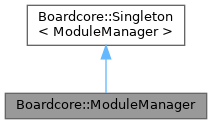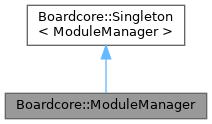Loading...
Searching...
No Matches
Boardcore::ModuleManager Class Reference
The module manager is a singleton object, so it can be instantiated only once. It contains all the active software modules which can be accessed in a centralized way. More...
#include <ModuleManager.hpp>
Inheritance diagram for Boardcore::ModuleManager:

Collaboration diagram for Boardcore::ModuleManager:

Public Member Functions | |
| ModuleManager () | |
| ~ModuleManager () | |
| template<typename T > | |
| bool | insert (T *element) |
| Inserts the module inside the array. | |
| template<class T > | |
| T * | get () |
| Get the Module object if present. | |
 Public Member Functions inherited from Boardcore::Singleton< ModuleManager > Public Member Functions inherited from Boardcore::Singleton< ModuleManager > | |
| Singleton (const Singleton &)=delete | |
| Singleton & | operator= (const Singleton &)=delete |
Friends | |
| class | Singleton< ModuleManager > |
Additional Inherited Members | |
 Static Public Member Functions inherited from Boardcore::Singleton< ModuleManager > Static Public Member Functions inherited from Boardcore::Singleton< ModuleManager > | |
| static ModuleManager & | getInstance () |
 Protected Member Functions inherited from Boardcore::Singleton< ModuleManager > Protected Member Functions inherited from Boardcore::Singleton< ModuleManager > | |
| Singleton () | |
Detailed Description
The module manager is a singleton object, so it can be instantiated only once. It contains all the active software modules which can be accessed in a centralized way.
- Note
- Because modules are identified by their type, only one module per type can be inserted into the module manager. This means that every module conceptually behaves like a singleton.
Example:
class Sensors : public SensorsModule {...};
// The user
ModuleManager::getInstance().get<SensorsModule>();
// This way substituting the instance below, the user doesn't actually know
// the difference as far as the upper interface is respected.
Definition ModuleManager.hpp:35
static ModuleManager & getInstance()
Definition Singleton.h:52
Definition at line 63 of file ModuleManager.hpp.
Constructor & Destructor Documentation
◆ ModuleManager()
|
inline |
Definition at line 68 of file ModuleManager.hpp.
◆ ~ModuleManager()
|
inline |
Definition at line 70 of file ModuleManager.hpp.
Member Function Documentation
◆ get()
template<class T >
|
inline |
Get the Module object if present.
- Returns
- T Software module.
- nullptr in case of a non existing software module.
- Note
- After the get call, no further insertion is allowed.
Definition at line 137 of file ModuleManager.hpp.
◆ insert()
template<typename T >
|
inline |
Inserts the module inside the array.
- Returns
- false in case an object of the same class has already been inserted or the maximum number of modules has been reached.
- Note
- Further insertions of modules after the first 'get()' call are not allowed. Please notice also that the module manager from this point handles completely the objects. Therefore at the destruction of the module manager, all the modules will be deleted.
Definition at line 94 of file ModuleManager.hpp.
Friends And Related Symbol Documentation
◆ Singleton< ModuleManager >
|
friend |
Definition at line 37 of file ModuleManager.hpp.
The documentation for this class was generated from the following file:
- src/shared/utils/ModuleManager/ModuleManager.hpp